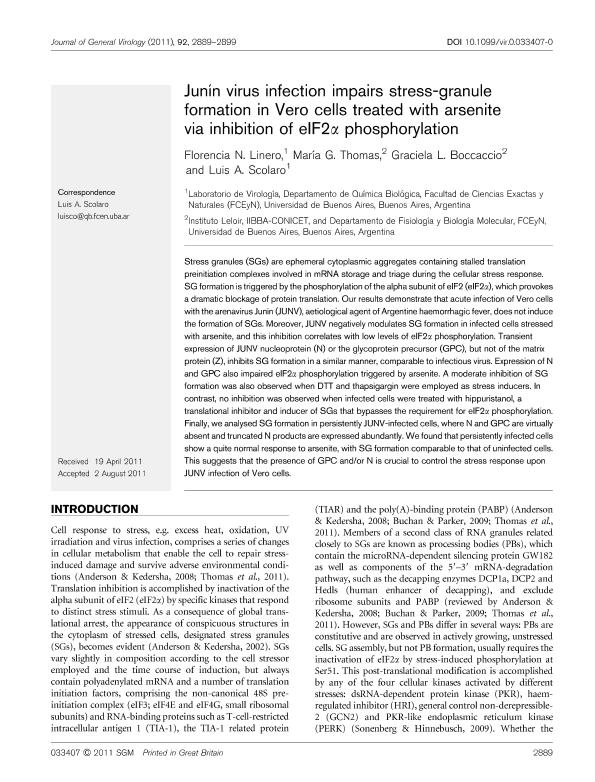Mostrar el registro sencillo del ítem
dc.contributor.author
Linero, Florencia Natalia

dc.contributor.author
Thomas, Maria Gabriela

dc.contributor.author
Boccaccio, Graciela Lidia

dc.contributor.author
Scolaro, Luis Alberto

dc.date.available
2017-02-09T21:46:57Z
dc.date.issued
2011
dc.identifier.citation
Linero, Florencia Natalia; Thomas, Maria Gabriela; Boccaccio, Graciela Lidia; Scolaro, Luis Alberto; Junin virus infection impairs stress-granule formation in Vero cells treated with arsenite via inhibition of eIF2α phosphorylation; Society For General Microbiology; Journal Of General Virology; 92; 2011; 2889-2899
dc.identifier.issn
0022-1317
dc.identifier.uri
http://hdl.handle.net/11336/12812
dc.description.abstract
Stress granules (SGs) are ephemeral cytoplasmic aggregates containing stalled translation preinitiation complexes involved in mRNA storage and triage during the cellular stress response. SG formation is triggered by the phosphorylation of the alpha subunit of eIF2 (eIF2α), which provokes a dramatic blockage of protein translation. Our results demonstrate that acute infection of Vero cells with the arenavirus Junín (JUNV), aetiological agent of Argentine haemorrhagic fever, does not induce the formation of SGs. Moreover, JUNV negatively modulates SG formation in infected cells stressed with arsenite, and this inhibition correlates with low levels of eIF2α phosphorylation. Transient expression of JUNV nucleoprotein (N) or the glycoprotein precursor (GPC), but not of the matrix protein (Z), inhibits SG formation in a similar manner, comparable to infectious virus. Expression of N and GPC also impaired eIF2α phosphorylation triggered by arsenite. A moderate inhibition of SG formation was also observed when DTT and thapsigargin were employed as stress inducers. In contrast, no inhibition was observed when infected cells were treated with hippuristanol, a translational inhibitor and inducer of SGs that bypasses the requirement for eIF2α phosphorylation. Finally, we analysed SG formation in persistently JUNV-infected cells, where N and GPC are virtually absent and truncated N products are expressed abundantly. We found that persistently infected cells show a quite normal response to arsenite, with SG formation comparable to that of uninfected cells. This suggests that the presence of GPC and/or N is crucial to control the stress response upon JUNV infection of Vero cells.
dc.format
application/pdf
dc.language.iso
eng
dc.publisher
Society For General Microbiology

dc.rights
info:eu-repo/semantics/openAccess
dc.rights.uri
https://creativecommons.org/licenses/by-nc-sa/2.5/ar/
dc.subject
Junin Virus
dc.subject
Sgs
dc.subject
Translation
dc.subject
Eif2alpha
dc.subject.classification
Bioquímica y Biología Molecular

dc.subject.classification
Ciencias Biológicas

dc.subject.classification
CIENCIAS NATURALES Y EXACTAS

dc.title
Junin virus infection impairs stress-granule formation in Vero cells treated with arsenite via inhibition of eIF2α phosphorylation
dc.type
info:eu-repo/semantics/article
dc.type
info:ar-repo/semantics/artículo
dc.type
info:eu-repo/semantics/publishedVersion
dc.date.updated
2017-02-07T13:51:57Z
dc.journal.volume
92
dc.journal.pagination
2889-2899
dc.journal.pais
Reino Unido

dc.description.fil
Fil: Linero, Florencia Natalia. Universidad de Buenos Aires. Facultad de Ciencias Exactas y Naturales. Departamento de Química Biológica. Laboratorio de Virología; Argentina
dc.description.fil
Fil: Thomas, Maria Gabriela. Consejo Nacional de Investigaciones Científicas y Técnicas. Oficina de Coordinación Administrativa Parque Centenario. Instituto de Investigaciones Bioquimicas de Buenos Aires; Argentina. Fundación Instituto Leloir; Argentina
dc.description.fil
Fil: Boccaccio, Graciela Lidia. Fundación Instituto Leloir; Argentina. Consejo Nacional de Investigaciones Científicas y Técnicas. Oficina de Coordinación Administrativa Parque Centenario. Instituto de Investigaciones Bioquimicas de Buenos Aires; Argentina
dc.description.fil
Fil: Scolaro, Luis Alberto. Universidad de Buenos Aires. Facultad de Ciencias Exactas y Naturales. Departamento de Química Biológica. Laboratorio de Virología; Argentina
dc.journal.title
Journal Of General Virology

dc.relation.alternativeid
info:eu-repo/semantics/altIdentifier/url/http://jgv.microbiologyresearch.org/content/journal/jgv/10.1099/vir.0.033407-0
dc.relation.alternativeid
info:eu-repo/semantics/altIdentifier/doi/http://dx.doi.org/10.1099/vir.0.033407-0
Archivos asociados
